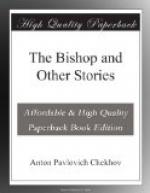Telegraph-poles with two wires on them stretched along the right side of the road to its furthermost limit. Growing smaller and smaller they disappeared near the village behind the huts and green trees, and then again came into sight in the lilac distance in the form of very small thin sticks that looked like pencils stuck into the ground. Hawks, falcons, and crows sat on the wires and looked indifferently at the moving waggons.
Yegorushka was lying in the last of the waggons, and so could see the whole string. There were about twenty waggons, and there was a driver to every three waggons. By the last waggon, the one in which Yegorushka was, there walked an old man with a grey beard, as short and lean as Father Christopher, but with a sunburnt, stern and brooding face. It is very possible that the old man was not stern and not brooding, but his red eyelids and his sharp long nose gave his face a stern frigid expression such as is common with people in the habit of continually thinking of serious things in solitude. Like Father Christopher he was wearing a wide-brimmed top-hat, not like a gentleman’s, but made of brown felt, and in shape more like a cone with the top cut off than a real top-hat. Probably from a habit acquired in cold winters, when he must more than once have been nearly frozen as he trudged beside the waggons, he kept slapping his thighs and stamping with his feet as he walked. Noticing that Yegorushka was awake, he looked at him and said, shrugging his shoulders as though from the cold:
“Ah, you are awake, youngster! So you are the son of Ivan Ivanitch?”
“No; his nephew. . . .”




